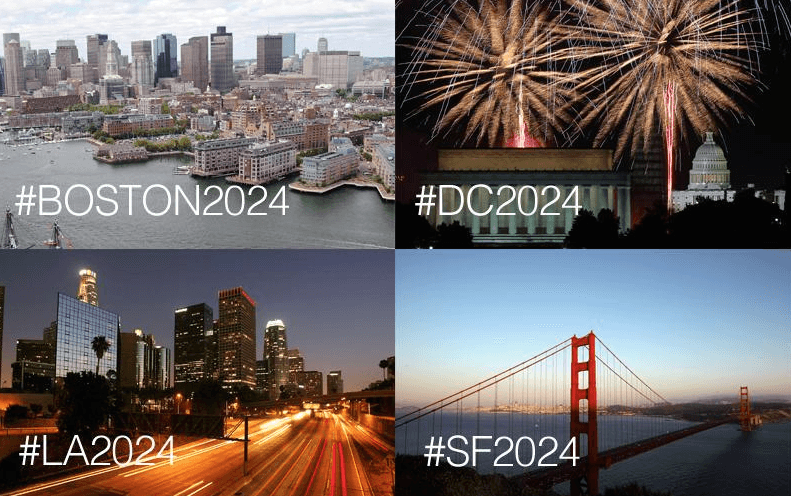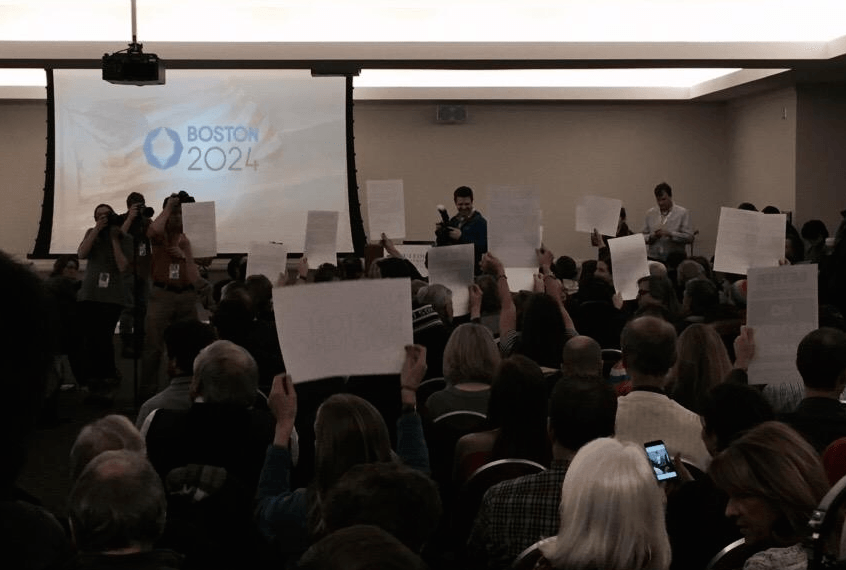
Barely a month ago, the United States Olympic Committee shocked the county (and anyone paying attention around the world) with its selection of Boston as the domestic bid for the 2024 Summer Olympics. As the Boston 2024 bid was quick to point out, this generated more than 80 million “social media engagements” around the world, all talking about Boston. Of course, most of the Tweets and Facebook posts included in that deluge were asking one very obvious question: Why Boston?
Instead of fading away in the periphery, as perhaps the Boston bid would’ve hoped, the question of “why” has only become more relevant. Even before the USOC’s decision was made, Boston had some compelling question marks, including the most vocal opposition to an Olympic bid. Because of this, it’s even more important to attempt an explanation for why Boston won the competition between the bids from Los Angeles, San Francisco and Washington D.C.
Here’s my best attempt.

Explanation 1: The company line
When I asked USOC Chairman of the Board Larry Probst the very direct “why Boston?” question at the press conference following the decision in January, he responded with the following line of reasoning regarding what Boston offers:
(It’s) a preliminary venue plan that is athlete-focused. We think the concept here is very cost-effective, we think it harmonizes with the longterm vision of the city. And we think it connects with Olympic agenda 2020 which is something that was just adopted by the IOC in Monaco this past December.
Basically, Probst quickly summarized the three main points of what I’ll call “the company line,” which is the explanation for Boston winning the bid that you’ll hear from anyone who is an advocate, or is directly associated with 2024.
Their explanation is built around a sellable pitch: That the Olympics became too expensive, and the International Olympic Committee knows that. As a result, they’re trying to make hosting the Games more affordable (hence the “2020 agenda” which is aimed at “sustainability”). Boston’s bid is instep with these goals, utilizing many existing facilities as well as embracing the trend towards temporary facilities.
Boston’s bid was the only one, for example, to propose a temporary Olympic stadium. They were out in front on the cost-effective trend, and were rewarded for it by the USOC, since they think that’s what the IOC wants.
Specifically, Boston 2024 harnesses arguably the most prized resource in the region: higher education institutions. Partnering closely with the likes of Harvard, MIT, BU, Northeastern and UMass Boston (among others), the bid is able to gain unique and cost-effective advantages, especially on potential venue sites. No other region in the country has that much higher ed potential to tap into.
More than that, the Boston bid fits with Boston Mayor Marty Walsh’s goals for the city in the long term. This was a subject that former 2024 President Dan O’Connell touched on during an interview I did with him in December:
It’s not about 2024, it’s not about the Games themselves, although I think he shares a sense that Boston would be very proud of hosting the Games. But it’s what the Games lead to. It’s not 2024, it’s 2030 (400 anniversary of Boston’s founding). The great thing about this tool is it’s all about 2030, it’s not about the Games, it’s about where the city’s going in the 21st century. It’s about there the innovation and technology industries are taking the city in terms of jobs and opportunities. It’s about retaining talent. We educate people from all over the world, but we lose too many of them on graduation day. Part of that talent retention is housing. So because of the legacy aspects of it, it’s fit very well with the Mayor’s priorities.
To summarize, Boston was chosen (according to this viewpoint) because it will create a historically “walkable games” with 28 venues all within relatively close proximity; it’s already-existing infrastructure plan is mostly in line with the Olympic strategy; it boasts a powerful partnership with some of the most prestigious universities in the world; and it restores sustainability and financial standards to hosting the Olympics while preserving the special experience that the Games provide for fans and athletes.

Explanation 2: The skeptic’s view
Boston’s Olympic opposition, as mentioned before, was the most organized and vocal in the country even before the USOC chose Boston 2024. After all, No Boston Olympics (the most prominent of several anti-Olympic groups whose views I’m trying to convey in this explanation) was the only group of any in the U.S. to formally participate in anything even resembling a public debate on the issue prior to the January decision. The opposition explanation for Boston’s victory is far different, and predictably more cynical.
Within (literally) five minutes of the announcement made by the USOC, I called No Boston Olympics Co-Chair Chris Dempsey, who as usual, was good enough to give me his thoughts:
Look, we’re going to keep fighting. We believe we represent the majority of people in the Commonwealth. Also, that citizens and taxpayers have deep skepticism about the Boston 2024 organization, and the promises that have been made behind closed doors to the USOC. We demand that Boston 2024 release the bid immediately, and we look forward to having a debate in the true Massachusetts fashion about whether or not this is good public policy.
With this, we start to touch on the “skeptic’s view” of why Boston was chosen. It begins and ends with transparency, or a lack thereof.
As history has shown, it’s never about how good your city’s “pitch” is. A well publicized report following the presentations to the USOC by the four U.S. cities in December noted that Boston’s was the “weakest,” though ultimately that didn’t seem to matter in the eyes of the USOC. Explaining that is easy for the skeptics.
To them, the USOC can make the most money by choosing Boston as opposed to the other cities. Boston was the most organized of the two east coast bids, and their timezone was the clincher. An east coast timezone carries with it the best possible U.S. primetime market. It also offers the best chance to reach the second best TV market (Europe) at reasonable hours, whereas the west coast does not.
Additionally, the support of Boston Mayor Walsh was critical. His opposition to an Olympic ballot question has helped to buttress Boston 2024’s relatively overt goal of avoiding a vote on the matter. Previous Olympic referendums haven’t gone well for the bids.
With this in mind, rationalizing Boston’s win in the skeptic’s mind centers around what happened “behind closed doors.” Again, Dempsey referenced this in his post-decision comments in January:
One thing that we’ve seen are reports that the bid was strengthened dramatically in the last 10 days, and that is another example of Boston 2024 making decisions behind closed doors without sharing that information, and sharing those decisions with the public. The entire process has been deeply troubling, and only more so if that report is true.
This particular explanation boils down to the following: The USOC, an organization whose non-profit status is debatable, chose Boston because it was the city that went the extra mile behind closed doors in an “auction environment.” This had nothing to do with particular details of an Olympic plan or pitch, but merely which bid the profit-oriented non-profit USOC could elicit the most money-making potential from. Given that NBC and other American groups pay the IOC’s bills to a larger degree than anyone else, the USOC clearly feels that a U.S. Olympics is going to happen, and they need to leverage it with an east coast market for maximum profitability. Boston provided the best avenue to do this.
Explanation 3: A moderate’s take
After examining the two very different explanations, it’s worth noting that each has dominated the conversation so far in Boston. Most Commonwealth residents with a formed opinion on the Olympic issue have seen the discourse all but monopolized by the polarizing points of view presented in these first two explanations. Still, there is a third door available in explaining Boston’s USOC bid victory, and it illustrates how the truth might fall somewhere in between.
Simply put, it’s impossible to completely know for sure the thought process of the USOC in their decision to select Boston. Anyone who tries to tell you otherwise is lying, whether they are for or against a bid. The fact is that unlike other major sports decision, where there might be an Adam Schefter type who leaks information beforehand, the USOC kept the lid completely on. Literally until the Tweet shown below, no one outside of the committee itself knew what the decision would be:
BREAKING: The USOC selects #Boston2024 as U.S. bid to host the 2024 Olympic & Paralympic Games http://t.co/P7IDlycrJ6 pic.twitter.com/zWS1i3WRo5
— US Olympic Team (@USOlympic) January 8, 2015
That would seem to justify the Boston 2024 skeptics, given the utter lack of transparency. Still, the perfect secrecy also means that the skeptic’s view is called into question, since they have no direct proof of what they claim to be an attempt by the USOC to choose Boston merely as a way of making the most money.
It’s impossible to know, so the “moderate” view holds to the following observations, which are the most plausible:
- The USOC certainly did factor in Boston’s favorable time zone, since Dan O’Connell noted this as part of the Boston bid’s advantages during a meeting with reporters on October 17. As far as the USOC’s supposed hyper-focus on financial potential, however, we simply cannot know that for sure, though they are a very profitable organization.
- Mayor Walsh’s support, however that’s interpreted, was definitely vital as the face of local government. However it’s too early to paint Walsh as an unflinching supporter of the bid. While he pitched the bid in the USOC presentation (which helped), and has fought openly against a referendum on hosting the Olympics, he’s backtracked in recent weeks. At the city’s first community meeting, he pointed out that the bid “is not a done deal.”
- While it’s unconfirmed that the report of Boston’s bid being strengthened on the eve of the USOC’s decision is true, it’s clear that backroom dealing was indeed happening. San Francisco swapped stadium plans at the last second, in an obvious attempt to further legitimize their plan. It’s also plainly true that Boston’s bid will likely change dramatically before a possible 2024 Games, and so the idea that the bid “wooed” the USOC with last-minute bid strengthening probably has a degree of truth to it as well. Again though, that’s unconfirmed.
- A point-by-point comparison of the four U.S. bids illustrates that Boston was even with its competition, and was (at the very least) not underwhelming going against the like of L.A. et al. Whatever the skeptics will argue, it’s undeniable that Boston does possess certain advantages in its bid (strong university partnerships as well as the potential for closer proximity of venues). This likely played a role. Even a cynical interpretation would identify those attributes as “sellable” to the IOC, without a doubt.
Ultimately, the moderate take can be summarized in this way: It’s overly simplistic to say that either Boston was chosen because of its superior bid, or on the other hand because the USOC purely had profit in mind. The answer lies somewhere in between. The USOC sees Boston as a potentially sustainable bid with strong university ties, but it also sees the potential of a primetime TV market. They aren’t fully the benevolent organization portrayed by those touting the “company line,” but neither are they the malevolent money-grabbers portrayed by the “skeptics.”
Conclusion
Obviously, the Olympic discussion in Boston is going to be an ongoing one. The IOC will not decide on Olympic bids for the 2024 Games until 2017, and Boston is still yet to formally submit. That said, understanding why Boston was chosen by the USOC in January is important in participating in any future 2024 conversation. In many ways, the public discourse is framed by the varying viewpoints regarding how Boston became the sole U.S. bid for the 2024 Olympics.
Whichever explanation you side with the most, it’s vital to comprehend the other two viewpoints as well. Only then can the complicated question of “why Boston?” be fully understood.
Featured image via US Olympics
